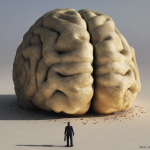We all want to know if technology benefits learning.
And yet, that question is far too large to answer sensibly. We need to focus.
Do laptops help learning. (There, that’s narrower.)
Do laptops help students take notes?
Do laptops help college students take notes during a lecture?
Now we’ve arrived at a question precise enough research.
Divided Attention?
In a recently-published study, Glass and Kang asked just such a precise question:
In college lecture halls, do technology distractions — especially laptops and cellphones — harm short-term learning? Do they harm long-term retention?
Because Glass teaches college lecture classes, he had the perfect opportunity to investigate this question.
The study design is straightforward. During half of the classes, his students were allowed to use technology. In the other half, they weren’t.
(The study design is a bit more complicated than that. Unless you’re really into research methodology, that’s the essential part.)
Did the absence of technology improve learning?
Divided Attention!
No. And, yes.
In the short term, the technology ban made no difference. Students did equally well on in-class quizzes whether or not they were distracted by their cellphones.
In the long term, however, the ban made a big difference. On the final exam, students scored higher on information they learned during distraction-free classes than on information they learned during classes where laptops were allowed.
How much better? About 7 points better. A jump from an 80 to an 87 is a lot of extra learning.
And here’s an essential point: students scored worse in classes where technology was allowed whether or not they themselves used technology.
As other researchers have found, technology distracts both the users and those around them. Divided attention interferes with retention, no matter whose cell phone does the dividing.
Practical Implications
This study shows, persuasively, that technology interferes with learning when it distracts college students from lectures.
However, it does NOT show that technology is bad for learning, or even that laptops and cellphones are bad during lectures.
In fact, the professor required students use their laptops and cellphones to answer retrieval-practice questions during class.
On “no technology days,” Glass had a proctor stand at the back of the lecture hall to ensure that no one used technology inappropriately. But: all Glass’s students used technology to help them learn. And they all used that technology during the lecture.
That is: technology wasn’t the problem. Misuse of technology was the problem.
To help our students learn, in other words, we needn’t ban technology. Instead, we should ensure that they use it correctly.
We might even share Glass’s research with them, and explain why we’re being so strict. They might not notice a problem in the short term. But in the long run, they’ll learn better with undivided attention.




